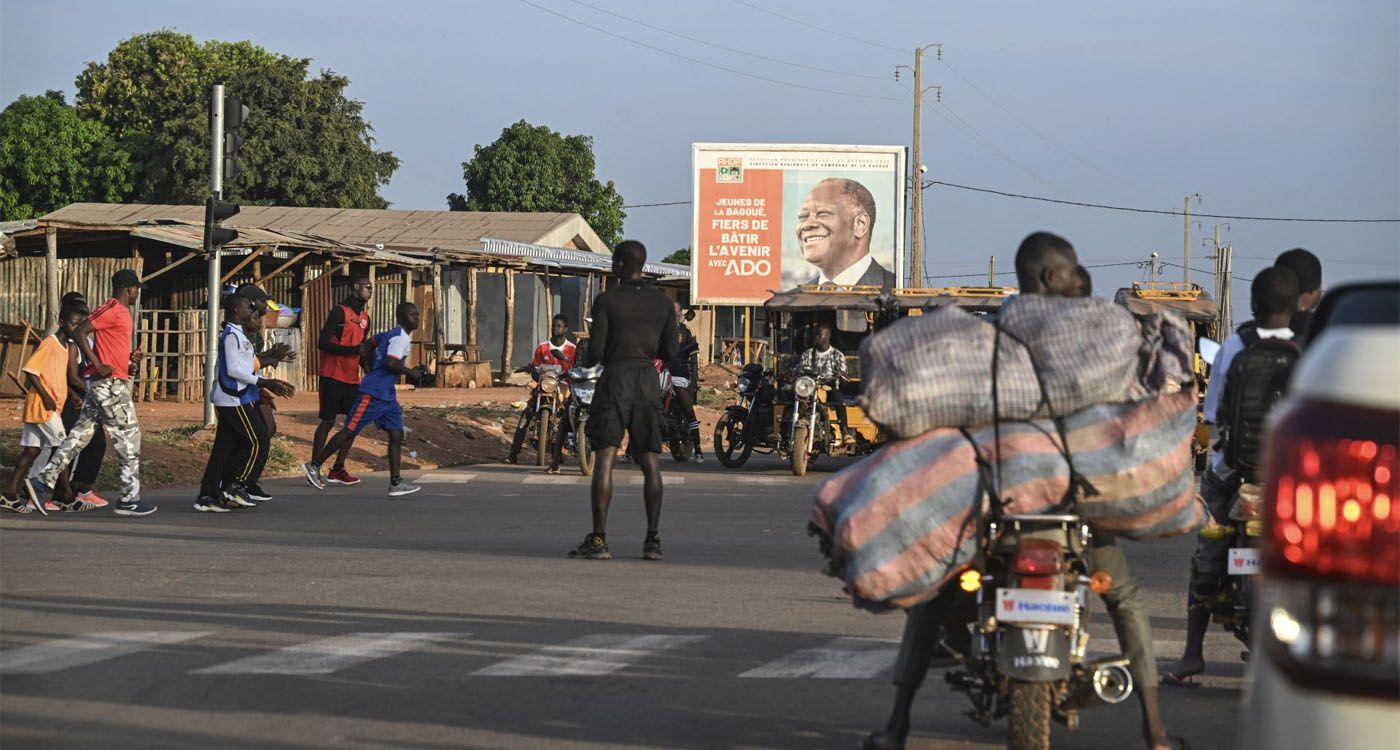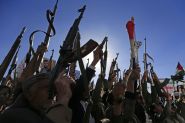- Home
- Middle East
- Mali Slides into Chaos Following French Withdrawal

Pedestrians cross a street in Boundiali, northern Ivory Coast, on November 1, 2025, where Ivorian truck drivers refuse to travel to Mali due to jihadist attacks. ©Issouf Sanogo / AFP
At the end of October, the United States issued an unequivocal warning to its citizens in Mali. In a statement released on October 28, the U.S. Embassy in Bamako urged American nationals to leave the country “immediately,” as the capital struggles with a severe fuel shortage imposed by armed groups linked to al-Qaeda.
Since September, fighters from the jihadist coalition Jama’at Nusrat al-Islam wal-Muslimin (JNIM) have blocked fuel imports. Tanker convoys have been targeted on the roads, paralyzing the national economy and threatening the capital’s supply.
“The ongoing disruptions to fuel supplies, the closure of public institutions, and clashes around Bamako are heightening the unpredictability of the security situation,” the embassy said. It is, unfortunately, a descent into chaos that had long been foreseeable.
The Departure of French Forces: A Major Turning Point
The current deterioration in Mali is directly linked to the security vacuum left by the withdrawal of foreign forces. According to the Atlantic Council, the country “clings to the illusion of military sovereignty” after cutting itself off from its allies and plunging into complete isolation.
When Colonel Assimi Goïta seized power by force in 2021, he promised the “rebuilding of a sovereign and secure Mali.” Four years later, the reality is starkly different: frontlines have multiplied, the army has fragmented, and jihadist groups once again control vast swaths of territory.
The gradual departure of French forces, which began in 2022 with the end of Operation Barkhane, marked a decisive turning point. According to the Institut Montaigne, this withdrawal on August 15, 2022, represented “the most radical change for jihadist groups, who regained a freedom of action they had lost nearly a decade ago.”
In other words, the French presence, imperfect as it was, kept steady pressure on armed groups. Its withdrawal allowed JNIM and its affiliates to gradually and methodically reclaim rural territories.
A Decade of Action, Ambiguous Results
The analysis from the Royal United Services Institute (RUSI) adds nuance to the idea that the French presence guaranteed stability. The British think tank notes that the 2013 intervention, launched to save Bamako from an imminent collapse, allowed several northern cities to be recaptured.
However, the initial successes of Operation Serval gradually eroded as the war evolved. Jihadist groups, initially defeated militarily, reorganized and adopted a diffuse insurgency strategy, deeply rooted in local communities.
According to RUSI, France then made a major strategic error by focusing on the “neutralization” of terrorist leaders without addressing the political and social roots of the conflict.
This approach had the opposite effect: rather than easing tensions, the prolonged use of force fueled resentment and strengthened the jihadists’ arguments. Missteps by the Malian army and abuses committed by its auxiliaries ultimately delegitimized the entire operation.
The Council on Foreign Relations reaches a similar conclusion: the end of military cooperation with France, followed by the withdrawal of the United Nations mission, created a vacuum in which jihadist groups have thrived.
In 2023, attacks more than doubled in central and northern Mali. The cities of Timbuktu and Menaka remain under direct threat from insurgents, while the road linking Bamako to Ségou, the country’s main internal artery, remains perilous.
Russia: An Even More Brutal Successor
Deprived of fuel, partners, and a unified army, Mali is sinking back into an existential crisis. The current blockade, which has paralyzed administration and transport, highlights JNIM’s ability to strike at the heart of the economy. This is no longer just a guerrilla war; it has become a smothering war.
The transitional authorities, supported by Russian mercenaries, have failed to reverse the trend. The June 2025 announcement of Wagner Group’s withdrawal after three and a half years on the ground was little more than a façade. RAND Corporation notes that Wagner fighters were simply absorbed into a new structure, the African Corps, under the direct control of the Russian Ministry of Defense.
This change, meant to enforce discipline, has instead made Moscow directly responsible for abuses on the ground. Since 2024, Malian and Russian forces have been accused of killing dozens of civilians and burning villages in central and northern Mali. The Tinzawaten massacres in the summer of 2024 heightened tensions between Malian officers and their Russian partners, who were seen as undisciplined and ineffective.
A Strategic Lesson for the West
A decade after the start of the French intervention, Mali remains a tragic laboratory for the limits of military force. France’s presence contained the threat but never resolved it, and its departure unleashed forces it had previously kept in check.
The lesson, RUSI emphasizes, is clear: military power only matters when paired with a coherent political strategy. The fuel blockade is a stark illustration. By withdrawing without a solid political framework, France left a vacuum that Russia filled through terror.
Today, Mali faces attacks, power outages, and endless queues at gas stations. Once supported by the international community, the country now finds itself caught between jihadist fire and the violence of its new protectors.
Read more




Comments